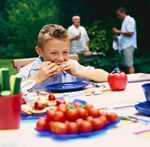Family Reunion Health and Safety Tips
 Family reunions are a great time to see relatives, celebrate your heritage, catch up on news, and create memories. Take steps to make sure your family get-together is safe and healthy.
Family reunions are a great time to see relatives, celebrate your heritage, catch up on news, and create memories. Take steps to make sure your family get-together is safe and healthy.
Plan a Healthy Menu
Serve food and drinks that are low in calories, sugar, salt, fat, and alcohol. Include a variety of fruits and vegetables, which provide essential vitamins and minerals, fiber, and other substances that are important for good health, and also may reduce the risk of cancer and other chronic diseases.
 Creating a family recipe book to hand out at the reunion? You can accommodate the dietary needs of relatives with high blood pressure, heart disease, diabetes, or other conditions. Keep recipes healthy by offering options that are low in calories, sugar, salt, fat, and alcohol. Find helpful meal planning hints to enjoy your favorite foods with healthier ingredients. Learn ideas for nutritious snacks.
Creating a family recipe book to hand out at the reunion? You can accommodate the dietary needs of relatives with high blood pressure, heart disease, diabetes, or other conditions. Keep recipes healthy by offering options that are low in calories, sugar, salt, fat, and alcohol. Find helpful meal planning hints to enjoy your favorite foods with healthier ingredients. Learn ideas for nutritious snacks.
Rethink your drink. Many people don’t realize how many calories beverages can contribute to their daily intake. There are plenty of options for reducing the number of calories in what you drink and in making smart beverage choices-for instance, choose water.
Prepare Food Safely
 Foodborne illness, sometimes called food poisoning, is caused by consuming contaminated foods or beverages. To help protect yourself and loved ones from foodborne bacteria, follow the recipe for food safety with these guidelines:
Foodborne illness, sometimes called food poisoning, is caused by consuming contaminated foods or beverages. To help protect yourself and loved ones from foodborne bacteria, follow the recipe for food safety with these guidelines:
Clean. Wash produce.
- Rinse fresh fruits and vegetables in running tap water to remove visible dirt and grime.
- Remove and discard the outermost leaves of a head of lettuce or cabbage.
- Because bacteria can grow well on the cut surface of fruit or vegetables, be careful not to contaminate these foods while slicing them up on the cutting board, and avoid leaving cut produce at room temperature for many hours.
- Don't be a source of foodborne illness yourself.
- Wash your hands with soap and water before preparing food.
- Avoid preparing food for others if you yourself have a diarrheal illness.
- Changing a baby's diaper while preparing food is a bad idea that can easily spread illness.
Separate. Don't cross-contaminate one food with another.
- Avoid cross-contaminating foods by washing hands, utensils, and cutting boards after they have been in contact with raw meat or poultry and before they touch another food.
- Put cooked meat on a clean platter, rather than back on one that held the raw meat.
Cook. Cook meat, poultry, and eggs thoroughly.
- Using a thermometer to measure the internal temperature of meat is a good way to be sure that it is cooked sufficiently to kill bacteria.
- Eggs should be cooked until the yolk is firm.
Chill. Refrigerate leftovers promptly.
- Bacteria can grow quickly at room temperature, so refrigerate leftover foods if they are not going to be eaten within 4 hours.
- Large volumes of food will cool more quickly if they are divided into several shallow containers for refrigeration.
Report. Report suspected foodborne illnesses to your local public health department.
- CDC and Food Safety
- Fight Bac (PFSE)
- Keep Food Safe (Foodsafety.gov)
Be a Mover
Some reunions may include walking, hiking, dancing, swimming, tennis, bowling, or other activities. You can socialize and stay fit at the same time. Pick fun physical activities to do together, and enjoy the health benefits!
- Adults need at least 2½ hours of moderate-intensity aerobic activity (such as brisk walking) every week, and muscle strengthening activities that work all major muscle groups (legs, hips, back, abdomen, chest, shoulders, and arms) on two or more days a week.
- Children and adolescents should do at least 1 hour of physical activity each day. Include activities that raise breathing and heart rates and that strengthen muscles.
Regular physical activity may help reduce your risk for many diseases, including cardiovascular disease, type 2 diabetes, and colon and breast cancers. It also helps to control weight; contributes to healthy bones, muscles, and joints; and reduces falls among older adults.
- How Much Physical Activity Do Children Need?
- How Much Physical Activity Do You Need?
- Physical Activity
Know and Share Your Family Health History
 A family reunion is a good time to share family history--people, events, places, and dates. Why not share your family health history too?
A family reunion is a good time to share family history--people, events, places, and dates. Why not share your family health history too?
A family health history is a written or graphic record of the diseases and health conditions present in your family. You can’t change your genes, but you can change behaviors that affect your health, such as smoking, inactivity, and poor eating habits. People who have a close family member with a chronic disease (for instance, cancer, coronary heart disease, and diabetes) may have a higher risk of developing that disease than those without such a family member.
Take a health quiz with family members to determine risk for certain diseases or conditions.
- Family Health History: Resources and Tools
- My Family Health Portrait
Travel Smart
Whether you’re traveling down the street, across the country, or overseas, be prepared. Don’t drink and drive, and don’t let someone else drink and drive. Always wear a seat belt while riding in a motor vehicle. Always buckle your children in the car using a child safety seat, booster seat, or seat belt, depending on their age and size.
If you’re taking a cruise, know your ship’s recent inspection scores. If you’re traveling internationally, make sure you have all the vaccinations required for that area. Check out travel notices designed to inform travelers about current health issues related to specific destinations.
Be Safe
Enjoy your reunion--and take precautions to make sure that family and friends are safe while visiting and playing. Prevent injuries from falls, drowning, sports activities, and more. Learn how to stay safe and healthy while enjoying the outdoors and traveling.
- Healthy Swimming / Recreational Water
- H2O Smartz
- Prevent Drowning
- Stay Safe While Boating
- Keep Your Cool in Hot Weather
- Skin Cancer Prevention
- Play Smart
- Injury, Violence, and Safety
Go Green
Be conscious of the environment--and help sustain it for future generations! Whenever possible, recycle items from your reunion, such as aluminum, glass, plastic, or paper. Use less and therefore throw away less. Reduce greenhouse gas emissions that contribute to global climate change.
Have a Healthy and Safe Family Reunion!
Top of PageRelated Links
- Page last reviewed: December 23, 2015
- Page last updated: February 5, 2014
- Content source:


 ShareCompartir
ShareCompartir